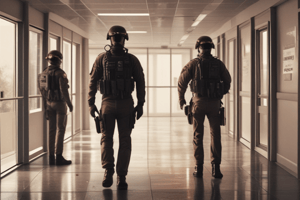Podcast
Questions and Answers
What is the purpose of the staging procedure for the Spring Fire Department?
What is the purpose of the staging procedure for the Spring Fire Department?
- To ensure the availability of resources for non-emergency incidents.
- To prepare members for annual safety training.
- To organize equipment for routine operations.
- To provide procedures for responding to emergency incidents that involve staging. (correct)
Who is responsible for reviewing the staging guideline annually?
Who is responsible for reviewing the staging guideline annually?
- All members of the department.
- The Fire Chief or designee. (correct)
- The unit officer.
- North Comm/TECC personnel.
What determines if staging procedures are required?
What determines if staging procedures are required?
- The information obtained from the initial 911 call. (correct)
- The arrival time of the first unit on scene.
- The discretion of the responding chief.
- The number of units dispatched to an incident.
What is the minimum recommended distance for a staging area from the dispatched location?
What is the minimum recommended distance for a staging area from the dispatched location?
How should responding units notify their arrival at the staging area?
How should responding units notify their arrival at the staging area?
What should responding units do if a prior unit is staged but hasn't communicated their location?
What should responding units do if a prior unit is staged but hasn't communicated their location?
What action should units take if cleared into the scene before other units arrive?
What action should units take if cleared into the scene before other units arrive?
What is the role of North Comm/TECC during an incident with staging?
What is the role of North Comm/TECC during an incident with staging?
Flashcards are hidden until you start studying
Study Notes
Staging for Law Enforcement
- Purpose: To provide information and procedures for Spring Fire Department members responding to emergency medical incidents requiring staging.
- Scope: Applicable to all Spring Fire Department personnel.
- Review: Annual review of the guideline by the Fire Chief or designee is mandatory.
- Staging Procedure:
- North Comm/TECC (dispatch center) determines if staging is necessary based on the 911 call.
- North Comm/TECC notifies responding units via radio to stage for law enforcement.
- A specific communication channel is assigned for the incident by North Comm/TECC.
- Units respond non-emergency to a staging area, determined by the apparatus officer or incident commander.
- The staging area should be at least 0.5 miles from the dispatched location, but this distance can increase based on threats and safe staging availability.
- Units cleared into the scene before others arrive upgrade to emergency traffic.
- All responding units communicate their staging location via radio.
- Staging location should be hidden from the scene.
- Upon arrival, units verbalize their staging location ("staged at (location)") via radio.
- If a prior unit is staged but doesn't announce their location, later units should locate it using mapping software and stage there.
- Units remain at the staging area until cleared by North Comm/TECC or law enforcement.
- North Comm/TECC communicates with law enforcement, provides staging locations of fire and EMS units, and records time references.
Studying That Suits You
Use AI to generate personalized quizzes and flashcards to suit your learning preferences.



